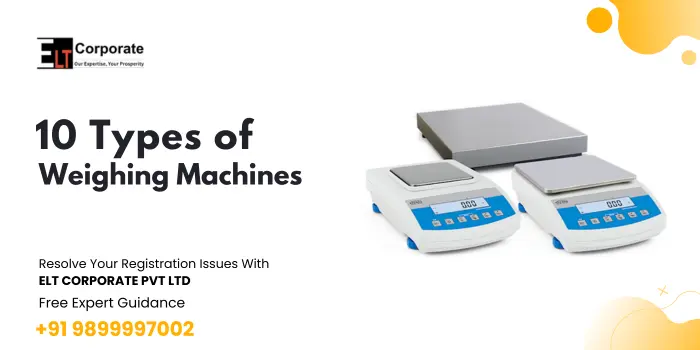Weighing machines are essential in many industries to provide proper quality control, pricing, and safety measurements. Most weighing machines are designed for home use, whereas others are for industrial or commercial work. Simply put, every work needs a different type of weighing scale, and there are different types of machines. So, let’s understand every requirement for various types of weighing machines.
What is Weighing Machines?
Weighing machines are instruments that are used to measure the weight and mass of any goods. It is commonly used in various industries such as retail, healthcare, logistics, manufacturing, and scientific research to ensure accurate weight measurements.
Spring Balance Weighing Machines
Check the details below to understand how spring balance work and where they are used best:
- Function – Spring balancing weighing machines utilize a spring that stretches out or squeezes depending on the weight we apply. The stretching or contraction demonstrates the weight.
- Use – Normally in informational experiments and low-scale commercial trade.
- Pros – Simple pattern and lightweight.
- Cons – Sometimes gives false results compared to digital and mechanical weighing scales.
Beam Balance Weighing Machines
Take a look below to know how beam balances work and where they are commonly used:
- Function – Beam balance weighing machines check the weight by comparing the obscure weight with an apparent reference weight.
- Use – Laboratories, educational setups, and to measure detailed weights in scientific experiments.
- Pros – Higher accuracy
- Cons – Generally heavy and inappropriate for hasty commercial trade.
Digital Weighing Machines
Read to see how digital weighing machines work and why they are preferred today:
- Function – Digital weighing machines are electronic detectors to check the weight, and the results are presented on a digital screen.
- Use – Retail, healthcare “bathroom scale,” or trading industries for fast and correct results.
- Pros – Accurate, reader-friendly screen, and accessible.
- Cons – Needs a power source.
Platform Weighing Machines
Check below to learn how platform weighing machines work and where they are mostly used:
- Function – Platform weighing machines are flat and utilized for weighing heavy objects. These scales can check the heavy objects from huge boxes or pallets.
- Use – Normally utilised in warehouses, logistics, and shipping industries.
- Pros: Measure heavy and massive objects accurately.
- Cons – Needs space.
Crane Weighing Machines
Have a look to understand how crane weighing machines function and where they are typically used:
- Function – Connected to cranes, these scales measure lifted loads.
- Use – Companies work with huge and heavy machinery, construction, and shipping.
- Pros – Essential for weighing large, heavy items.
- Cons – Costly
Counting Scales
Check what counting scales do and why they’re
- Function – Counting scales assist in counting objects depending on their weights. They can check the number of objects based on the weight of a sample.
- Use – Inventory machinery management and warehouse to check heavy items.
- Pros – higher productivity in handling substantial quantities.
- Cons – Needs calibration for proper counting.
Kitchen Weighing Machines
- Function – Kitchen weighing machines are more meticulous weighing scales usually used to measure baking or cooking ingredients.
- Use – Kitchens, food production, and laboratories.
- Pros – Small
- Cons – Made for weighing small objects.
Bathroom Weighing Machines
- Function – Bathroom weighing machines are Digital or mechanical and mainly used for checking body weight.
- Use – Personal use or fitness center.
- Pros – Affordable.
- Cons – Restricted to personal use and may not be as enduring.
Load Cell Weighing Machines
- Function – Load cells weighing machines convert the force of weight into an electrical signal, then shown as a weight measurement.
- Use – These are commonly used in companies and scientific applications requiring detailed measurement.
- Pros – Highly correct.
- Cons – Costly and needs calibration.
Electronic Weighing Machines
- Function – Electronic weighing scales are normally load cells, to check weight and convert the force of the object into an electrical signal.
- Use – Retail, healthcare, personal use, and industrial.
- Pros – Highly accurate, easy to use, and convenient.
- Cons – Costly and power dependency.
Key Considerations When Choosing a Weighing Machine
There are several points you should consider before choosing the right weighing machine:-
- Accuracy: Distinct weighing machines give different extents of accuracy, and choosing the correct one is required for the best result.
- Capacity: Confirms that the weighing machine scales can handle the weight of the item you arrange to weigh.
- Portability: Opt for a small and lightweight model if you require a weighing machine for mobile use.
- Power Source: Several machines need batteries, whereas others are power-operated.
- Maintenance: Examine how easy it is to maintain the weighing scale machines.
- Cost: More accurate and huge capacities typically come with a higher price.
Buying Guide: How to Choose the Right Weighing Machine
Choose the right weighing machine based on your specific needs and usage. Check the key factors you should consider to select the correct weighing machine:
- Accuracy – Look for machines with high precision, especially if used for commercial or scientific purposes.
- Portability – If you need to move the scale frequently, select a lightweight and compact model with easy handling features.
- Power Source – Consider whether the machine runs on batteries, electricity, or both. For remote or mobile use, battery-operated options are more practical.
- Usage Environment – Pick a machine suited to its environment: industrial, retail, laboratory, or kitchen. Make sure it can withstand dust, moisture, or rough handling if needed.
These are the few points you must consider before buying a weighing machine.
Top Brands & Models in the Market
Here we have created a list with the top brands & models in the market across different categories to help you make the right choice:
- Omron HN 286
- Healthgenie HD 221
- Hesley BMI Scale
- HealthSense PS 126 Ultra Lite
- Dr Trust Smart Scale
- Eagle Digital Weighing Scale
- Nova BGS-1260 Ultra Lite
- Rossmax WB102 Digital Scale
- AccuSure Weighing Scale
- Garmin Index S2 Smart Scale
- Tanita RD-953 Segmental Body Composition Monitor
- InBody H20N Smart Full Body Composition Analyzer
Maintenance Tips for Long-Lasting Performance
To confirm accurate reading and extend the life of your weighing machine, regular maintenance is important. If still you are confused you can directly contact on +91 9899997002 Follow these tips for cleaning, calibrating, and storing your device:
Cleaning
- Use a Soft, Damp Cloth
- Disinfect Gently
- Avoid Water Seepage
Calibrating
- Place Scale on a Flat & Hard Surface.
- Follow Manufacturers Instructions
- Use a Known Weight
Storing
- Store in a Dry & Dust Free Area
- Keep it Flat & Stable
- Remove Batteries
Conclusion
In the end, knowing the different types of weighing machines is necessary for selecting the right option based on the needs. Even if you require a portable bathroom scale, a detailed digital scale for retail, or an industrial platform scale, there is an appropriate machine for all instruments. Make this confirm that you consider these essential things like accuracy, capacity, and safeguarding, to get the most out of your weighing machine.
What is the Most Accurate Type of Weighing Machine?
Digital and load cell-related weighing scales give accurate results, mainly in industrial and scientific applications.
Can I Use a Kitchen Scale for Measuring Heavier Objects?
Kitchen weighing machines are created for lighter things; that is why they are not suitable for heavy items. A platform weighing machine is more appropriate for this.
How Do I Maintain My Digital Weighing Machine?
Frequently calibrate your digital weighing machine, keep it clean, and ensure it is utilized on a firm platform to maintain its accuracy.








